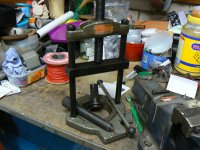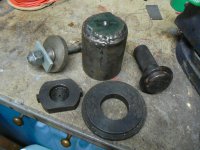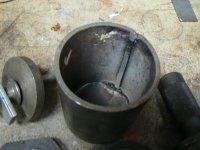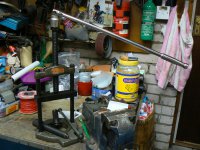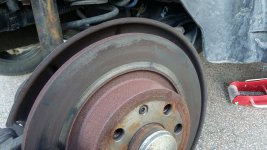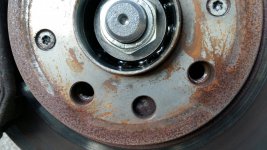So I am trying to diagnose this, far from being even near sure. There is a constant rather loud buzz that comes on around 70 km/h, peaks at 90, goes sort of away by 120. No difference when rpm change, gear, clutch in or out, or even when turning. Seems to be only rolling speed.
Well that certainly sounds like a wheel bearing problem. - just might be final drive but typically that would vary with power on/ power off and is a less likely scenario.
So lets go with wheel bearings for now. It sounds like you haven't yet dismantled anything? If so you can do a bit more diagnosing. Find a nice empty bit of road, deserted large car park, or anywhere that you can drive at moderate speed without endangering yourself or others. Get up to the speed at which you hear the noise and "weave" That is to say steer left and right. You are trying to load and unload the wheel bearings - but don't get "silly" with it, you are not trying to roll the car! Make sure the "Boys in Blue" aren't around as they seem to be fascinated by these sort of activities and will be keen to have a "chat" with you! If it's a bearing it should get more noisy under load and reduce, or possibly disappear, when unloaded. So if it gets louder when you turn right then it's the left side and if more noisy on left lock then it's the right side. Usually it's pretty obvious if it's front or rear but occasionally more than one bearing will be worn or noises are being transmitted through the body shell just to fool you. You can also jack up each wheel in turn, try to "rock" them top to bottom and side to side to check for play, then spin them by hand whilst listening for the "rumble" of a worn bearing but sometimes, because it's unloaded, it won't make much noise. Also, on front wheel drive, it can be difficult to spin them up enough to diagnose because of driveshaft and gearbox drag. If this is the case you can spin it up using the car's engine but you need to chock the other wheels and apply the hand brake tightly. Ok you classic SAAB owners, I know your handbrakes work on the front wheels! Then with that corner of the car on an axle stand select 2nd gear, or you may need 3rd (but try 2nd first) and with the engine running let the clutch in gently. Be aware that because the other driven wheel is on the ground the differential is going to cause the "free" wheel to spin at twice the speed, for any set engine RPM compared with what it would if you were driving down the road. So you don't need to rev the nuts off it to spin the wheel up to a fast speed. Above all be SMOOTH about what you do - let the clutch in smoothly and gently. increase and decrease engine RPM smoothly and gradually - You don't want to jerk it off the stand and, of course, absolutely no one standing in front or behind!
By the way, particularly when you are spinning the wheel by hand, expect to hear the brake pads/linings "skiffing" against the disc/drum as you rotate it and you may need to very slightly retract brake pads as they will often exert enough drag on a hub to stop the wheel spinning freely. Also Keep the brain "engaged" all the time as unexpected things can happen. My first "unexpected happening" was when many years ago I spectacularly removed the skin from the outside of all four of the fingers on my right hand when servicing an Austin 1100. On this model (and It's sister 1300 variants) the rear tyre ran so close to the swing arm casting that there was not enough room for fingers too! If you were right handed it was usually the OSR (driver's side rear) wheel that got you. With the car up on the ramp you would do your "rocking" checks for play and then, without thinking - because you had done it so often on so many other cars - The right hand would grip the top of the tyre and give it a vigorous tug down to the right to spin it up. trouble was, on this car, there was only about 3/4 of the thickness of a finger between the suspension casting and the tread of the tyre. Casting? very hard and roughly knobbly! Tyre? Typically rubbery and grips fingers very well! Fingers? Soft and easily squished! Outcome? A bloody mess! However, I can assure you, not as messy as putting the tips of your right middle finger, and the one beside it, into the blade of a running rotary lawnmower! Although it pulls lots of attention and sympathy It's not really worth it and it doesn't half hurt when the nurse scrubs the ingrained dirt out with, what looked suspiciously like, a nail brush.
So good luck with whatever you decide to do. If you decide to try any of the above please be very careful and if you really don't know what your doing then don't try it! I can't be there to keep you safe so be it on your own head!! I underwent nearly 5 years of training, gained City and Guilds qualifications, Became a full member of the institute of the Motor Industry (had letters after my name Oh yes!) and still manage, to this day, to regularly injure myself! Mrs Jock has Elastoplast, bandages and Germolene ointment in an old ice cream tub on the kitchen worktop so she can grab it in a hurry!


